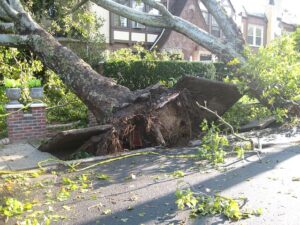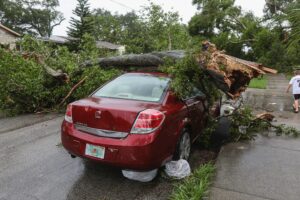Homes in a pristine green neighborhood are precious assets, as homeowners rush to buy them. There is no doubt that living in a home that’s surrounded by trees is a fantastic experience… that is until one of them falls on the neighbor’s house!
It can happen because of storms or lack of proper upkeep, but no matter what the reason, it usually results in neighborly conflicts over who is liable for the loss.
This makes it vital to understand state laws and know your rights in the dispute over fallen trees, before you take radical measures.
Massachusetts law already had precedence for such cases, offering ways to draw definitive lines and to prevent costly lawsuit proceedings.
What Is The Massachusetts Law About Neighbors And Trees?
The decision issued by the Massachusetts Supreme Judicial Court (SJC) presents an answer to a simple yet essential question: When is a homeowner liable for a tree on their land?
Long story short, the bill was passed after a case was brought to court about a pesky neighborly dispute over the damage caused by a tree that fell over from one property over to the other. The latter filed a lawsuit claiming money for the damages incurred and a sanction asking the other to cut off the tree for good.
But before we go into the details of this law, let’s find out why it’s a good idea to have one.
Some of the benefits of the Massachusetts fallen tree regulation are:
- simplified accountability for the tree owner and the property owner
- Minimal legal proceeding costs to the parties involved
- Fewer lawsuits stemming from alleged tree problems
The fallen tree law addresses the following aspects regarding the disputes over fallen tree:
Who Is Liable When A Tree Falls Off From A Neighbor’s Property?
The Massachusetts SJC reiterated the long-standing law that pronounces that the neighbor shouldn’t be held liable by the landowner if it was a properly maintained and healthy tree. Since the tree was adequately maintained, hence the damage resulted from the tree won’t be the tree owner’s concern.
Who Would Be Responsible For The Damages?
Under the act, the problem should be addressed by the homeowner whose property is damaged by the fallen tree. The owner of the tree could not be blamed for the destruction caused by the tree unless the tree was decayed or diseased.
Does It Give The Right To The Homeowner To Remove The Tree?
The court decision entitles the owners to take action if the neighbor’s tree crosses their property boundary. It allows the landowner to exercise his control and cut off a tree’s roots, stem, or other parts if they interfere and hinder the homeowner’s property in any way. Property rights in Massachusetts are paramount.
Would The Owner Be Liable For The Losses If It’s A Unhealthy Tree?
Of course, in case of an unhealthy tree that breaks apart and falls over onto other’s property, the owner remains accountable for any damages and will have to bear the losses incurred to the affected neighbor. The non-labiality clause would not be applicable in such cases. But, if a tree is well maintained, all bets are off.
What If The Tree Is At The Risk Of Falling?
If the tree is on the verge of falling, and the tree owner ignores it, they’ll likely have to pay for the negligence. Naturally, taking care of it is your responsibility, so it’s prudent to examine your trees.
Ultimately, it is imperative to upkeep all the property that comes under an individual’s ownership. The court’s decision doesn’t apply to any encroaching tree that falls over due to natural reasons.
What If Someone Intentionally Harms A Tree?
The statute prohibits the locals from deliberately damaging a tree. Intentional harm or injury to the tree can result in hefty penalties and, in some cases, imprisonment. Destroying a healthy tree could count as theft or residential property damage.
Be mindful of the consequences before committing such an illegal act. While you are entitled to cut back the trees that are trespassing your property, the MA law enforces hefty fines for deliberately destroying the trees.
What Happens If A Tree (Or A Part Of It) Falls Over Due To Storm?
Is the homeowner liable for the damage caused by their tree, or its branches, on a neighbor’s property due to weather events, such as storms?
Well, the answer is no, except if the tree was not well-maintained and the homeowner overlooked the requirements to keep it healthy, then the neighbor can claim damages and may demand compensation.
However, the straightforward answer is, your neighbor will not be legally responsible for a healthy tree that fell during a storm. On the other hand, if the tree was old and decaying, and its owner continued to neglect it even though it was at risk of falling, it would be possible to prove liability and negligence.
In either cases, let’s hope that they have homeowner’s insurance to help sort out the fault, blame and resulting payments, if any.
Get Legal Support On Tree Laws And Neighbor Disputes
If you are trying to avoid a dispute with your neighbor over a hazardous tree problem, now is the right time to consider getting a legitimate resource to help you navigate the legal intricacies.
Is your neighbor showing reluctance about reaching a mutually beneficial resolution regarding the removal of trees that cross your property line?
Richard Mucci can ease most of your troubles with professional assistance. He will help you with the necessary paperwork and guide you with the proper steps regarding conflicts involving trees and neighbors.
You don’t have to fret about legalities as the law offices of Richard Mucci will prudently analyze the dispute and will suggest practical solutions. He will work as a mediator and try to resolve your problem amicably.
If your neighbor refuses to cooperate with you in harmony, it is advisable to reach out to an experienced attorney who can help you resolve disagreements.


